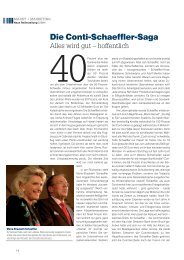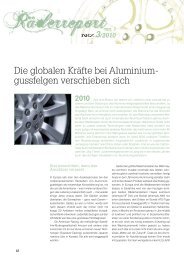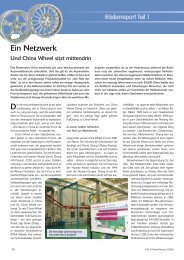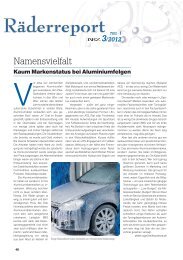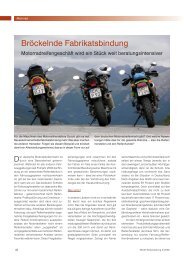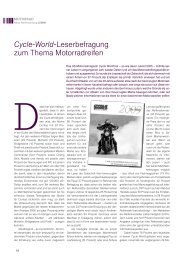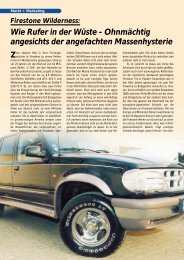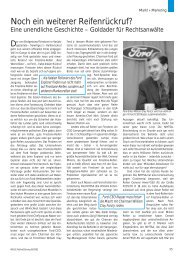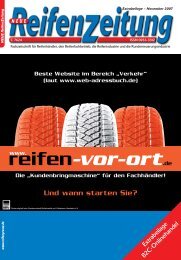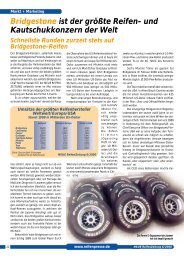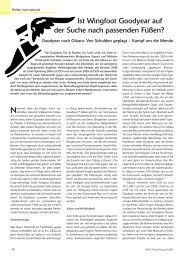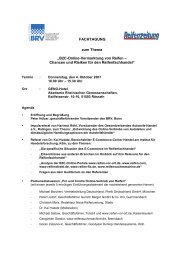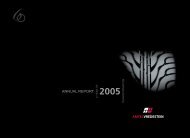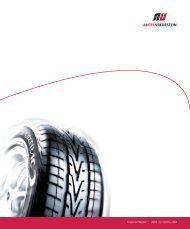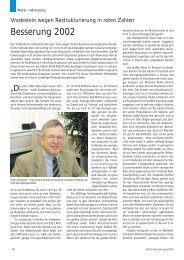NEUE REIFENZEITUNG Extrabeilage/China ... - Reifenpresse.de
NEUE REIFENZEITUNG Extrabeilage/China ... - Reifenpresse.de
NEUE REIFENZEITUNG Extrabeilage/China ... - Reifenpresse.de
Erfolgreiche ePaper selbst erstellen
Machen Sie aus Ihren PDF Publikationen ein blätterbares Flipbook mit unserer einzigartigen Google optimierten e-Paper Software.
from <strong>China</strong>. Even if European and Chinese partners have<br />
commonly <strong>de</strong>veloped a new tread pattern inten<strong>de</strong>d to be sold –<br />
by the European partner – on the European replacement market<br />
this may be no guarantee that tyres will be supplied. Sometimes, if<br />
the price is right, a competitor gets these tyres and sells them at a<br />
profit. This and other similar inci<strong>de</strong>nts occur when you do business<br />
with Chinese tyre companies, Mr Bernaerts says. Furthermore,<br />
there are always doubts whether a Chinese partner has the<br />
same un<strong>de</strong>rstanding of the words “sole agent.” It is common, he<br />
continues, that an exclusive European importer is faced with<br />
competition when “his brand” is also sold to other importers just<br />
because capacities are available and the price is right.<br />
Although the owner of International Bernaerts Trading is a<br />
specialist when it comes to the Chinese tyre market (he won’t<br />
officially give <strong>de</strong>tails about his preferred brands, sales or turnover<br />
figures) and has close business relations there, he is very critical<br />
about the quality of tyres produced in <strong>China</strong>. He even asserts that<br />
the vast majority of tyres produced in <strong>China</strong> and sold in Europe do<br />
not comply with the ECE-R30 standards. “Chinese people still<br />
don’t exactly know what quality means,” he says, and they often<br />
don’t pay close attention to uniformity, balance, tread life or the<br />
load and speed indices of tyres. Some tyres produced in <strong>China</strong><br />
need up to 150 grammes of balancing weights. So-called DA,<br />
BLEM or second-quality tyres are often dispatched to European<br />
replacement markets. This is partly because clueless importers<br />
sometimes hope to make a <strong>de</strong>cent profit on these tyres, which are<br />
obviously offered at very competitive prices by Chinese manufacturers<br />
or agents and brokers. Guido Bernaerts has seen some bad<br />
tyres in the course of his career: “You could cry your eyes out.”<br />
However, there are positive examples of when Chinese manufacturers<br />
invest in upgrading their production facility and in making<br />
the production process more efficient. But these examples are<br />
rare and can be found – if at all – only with privately owned companies.<br />
There is no real benefit to the efficiency of a tyre factory if<br />
the owner invests hundreds of millions in new equipment at all<br />
stages of the production process and workers – like in the good<br />
old past – continue to cut the layers of casings manually even<br />
though the correct equipment is there. This is why the efficiencies<br />
of many production facilities are comparably weak when the state<br />
or a province owns the tyre factory and <strong>de</strong>cisions are ma<strong>de</strong> not<br />
only based on economic criteria, but political as well.<br />
At the same time it is worth noting that tyres produced in<br />
<strong>China</strong> are getting better and better in terms of quality, says Guido<br />
Bernaerts, pointing out that there are many factories in <strong>China</strong> that<br />
are currently being upgra<strong>de</strong>d according to Western standards. The<br />
number of Chinese tyre manufacturers selling their products in<br />
the European and North American replacement markets is going<br />
to increase in the near future, that’s something we can be assured<br />
of, the owner of International Bernaerts Trading says. Currently<br />
there are about ten companies in <strong>China</strong> that sell their products in<br />
Europe.<br />
International Bernaerts Trading has recently begun selling its<br />
new “Optima“ private brand, produced in <strong>China</strong>, in European<br />
markets. There are 51 different PCR dimensions available; later on<br />
there will also be Optima truck tyres. Together with this new<br />
private brand Bernaerts hopes to sell up to 3 to 4 million units<br />
annually by the end of next year.<br />
arno.borchers@reifenpresse.<strong>de</strong>/sg<br />
rend ein europäischer Gesprächspartner schriftlich fixierte Verabredungen<br />
in <strong>de</strong>r Regel als Vertrag bzw. Vertragsgrundlage akzeptiert,<br />
seien entsprechen<strong>de</strong> Papiere für Chinesen „<strong>de</strong>r Anfang einer<br />
Diskussion“ und sie fühlten sich oftmals noch zu nichts verpflichtet.<br />
Entsprechen<strong>de</strong> „Mentalitätsunterschie<strong>de</strong>“ müsse man verstehen<br />
und akzeptieren, wenn man mit chinesischen Unternehmen<br />
Geschäfte machen will. Selbst wenn man gemeinsam mit einem<br />
chinesischen Partner ein neues Profil entwickelt und in Europa auf<br />
<strong>de</strong>n Markt bringen möchte, be<strong>de</strong>ute dies noch lange nicht, dass<br />
man als Quasi-Auftraggeber und Co-Entwickler am En<strong>de</strong> auch beliefert<br />
wird, erzählt Guido Bernaerts aus seinem Erfahrungsschatz;<br />
Entsprechen<strong>de</strong>s sei ihm bereits passiert zugunsten eines Wettbewerbers.<br />
Auch könne man sich nie sicher sein, dass ein chinesischer<br />
Geschäftspartner dasselbe unter <strong>de</strong>m Begriff „Sole Agent“<br />
(Exklusivimporteur) versteht wie ein europäischer Importeur. Oft<br />
genug tauchten eigentlich als exklusiv zugesicherte Reifen über<br />
an<strong>de</strong>re Quellen auf <strong>de</strong>m Markt auf.<br />
Auch wenn <strong>de</strong>r Inhaber von International Bernaerts Trading im<br />
<strong>China</strong>-Geschäft überaus aktiv ist (Details zu Marken, Absätzen<br />
o<strong>de</strong>r Umsätzen will Guido Bernaerts nicht nennen), lässt er kein<br />
gutes Haar an <strong>de</strong>r Qualität chinesischer Produkte. Er behauptet<br />
sogar, dass ein Großteil <strong>de</strong>r in <strong>China</strong> gefertigten und in Europa<br />
vermarkteten Reifen nicht <strong>de</strong>n hohen Anfor<strong>de</strong>rungen <strong>de</strong>r ECE-R30<br />
für die Erlangung einer E-Kennung entsprechen. „Chinesen wissen<br />
immer noch nicht, was Qualität heißt“, und beschwert sich<br />
über Reifen, <strong>de</strong>ren Rundlauf, Unwucht, Laufleistung o<strong>de</strong>r Lastbzw.<br />
Speedin<strong>de</strong>x nicht <strong>de</strong>n Anfor<strong>de</strong>rungen entsprechen. Es gebe<br />
Reifen aus <strong>China</strong>, die mit bis zu 150 Gramm ausgewuchtet wer<strong>de</strong>n<br />
müssten. So genannte DA-, BLEM- o<strong>de</strong>r Zweite-Wahl-Reifen<br />
fin<strong>de</strong>n ebenfalls oft <strong>de</strong>n Weg nach Europa – teilweise über ahnungslose<br />
Importeure, die auf das schnelle Geld hoffen. Er habe<br />
in seiner Laufbahn Reifen gesehen: „Da kann man nur weinen.“<br />
Es gebe zwar positive Beispiele, wo chinesische Hersteller<br />
sinnvoll und effizient in die Erneuerung ihrer Mischereien und Reifenproduktionen<br />
investiert haben. Nur entsprechen<strong>de</strong> Beispiele<br />
seien rar und – wenn überhaupt – ausnahmslos bei Reifenherstellern<br />
zu fin<strong>de</strong>n, die sich im Privatbesitz befin<strong>de</strong>n. Es nütze wenig,<br />
hun<strong>de</strong>rte Millionen in neue Anlagen zu investieren, wenn trotz<br />
vorhan<strong>de</strong>ner Technologie die Karkasslagen von Hand zugeschnitten<br />
wer<strong>de</strong>n, da die Mitarbeiter das schon immer so gemacht haben.<br />
Entsprechend niedrig sind die Effizienzen in vielen Produktionsstätten,<br />
gera<strong>de</strong> wenn <strong>de</strong>r Staat bzw. eine Provinzregierung als<br />
Arbeitgeber auftritt und unternehmerische Entscheidungen eben<br />
nicht nur anhand von wirtschaftlichen Kriterien fällt.<br />
Dennoch: Es sei anzumerken, dass auch chinesische Reifen<br />
stetig an Qualität gewinnen, so Guido Bernaerts, und die Umstellung<br />
<strong>de</strong>r Fabriken in <strong>China</strong> ist noch in vollem Gange. Die Anzahl<br />
chinesischer Reifenhersteller, die ihre Produkte in Europa und<br />
Amerika vermarkten wollen, wird in Zukunft zunehmen, da könne<br />
man sich sicher sein. Gegenwärtig seien dies gut zehn Unternehmen,<br />
die ihre Produkte in Europa anbieten.<br />
International Bernaerts Trading legt <strong>de</strong>rzeit eine Eigenmarke<br />
namens „Optima“ auf, die in <strong>China</strong> gefertigt wird. Es han<strong>de</strong>lt sich<br />
dabei zunächst um 51 Dimensionen Pkw-Reifen; später sollen<br />
auch Lkw-Reifen hinzukommen. Inklusive <strong>de</strong>r neuen Eigenmarke<br />
will Bernaerts bis En<strong>de</strong> <strong>de</strong>s kommen<strong>de</strong>n Jahres drei bis vier Millionen<br />
Reifen jährlich absetzen.<br />
arno.borchers@reifenpresse.<strong>de</strong><br />
7



